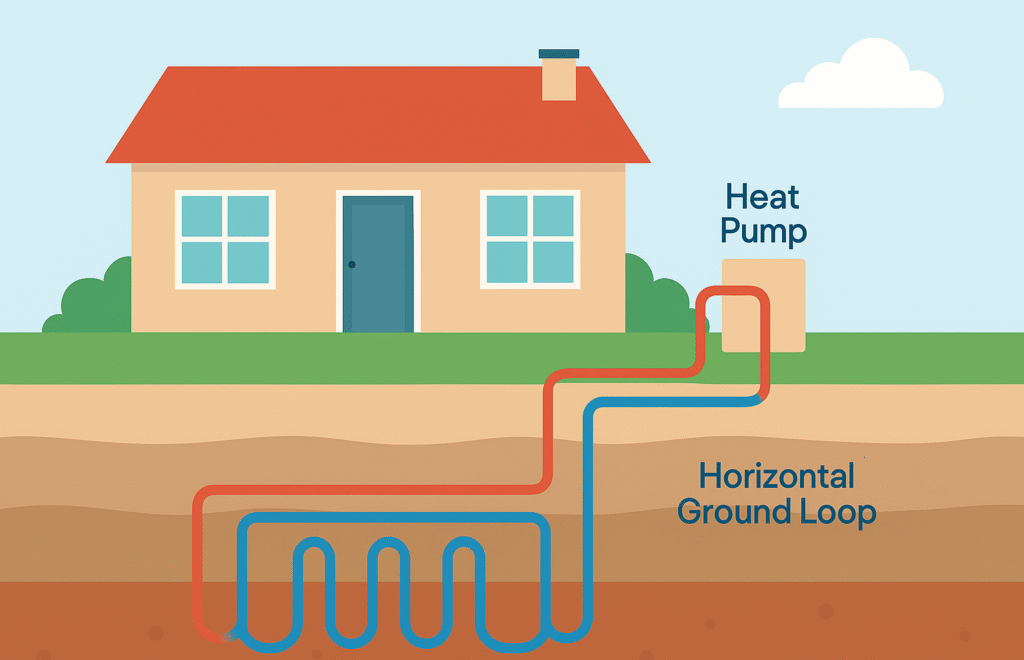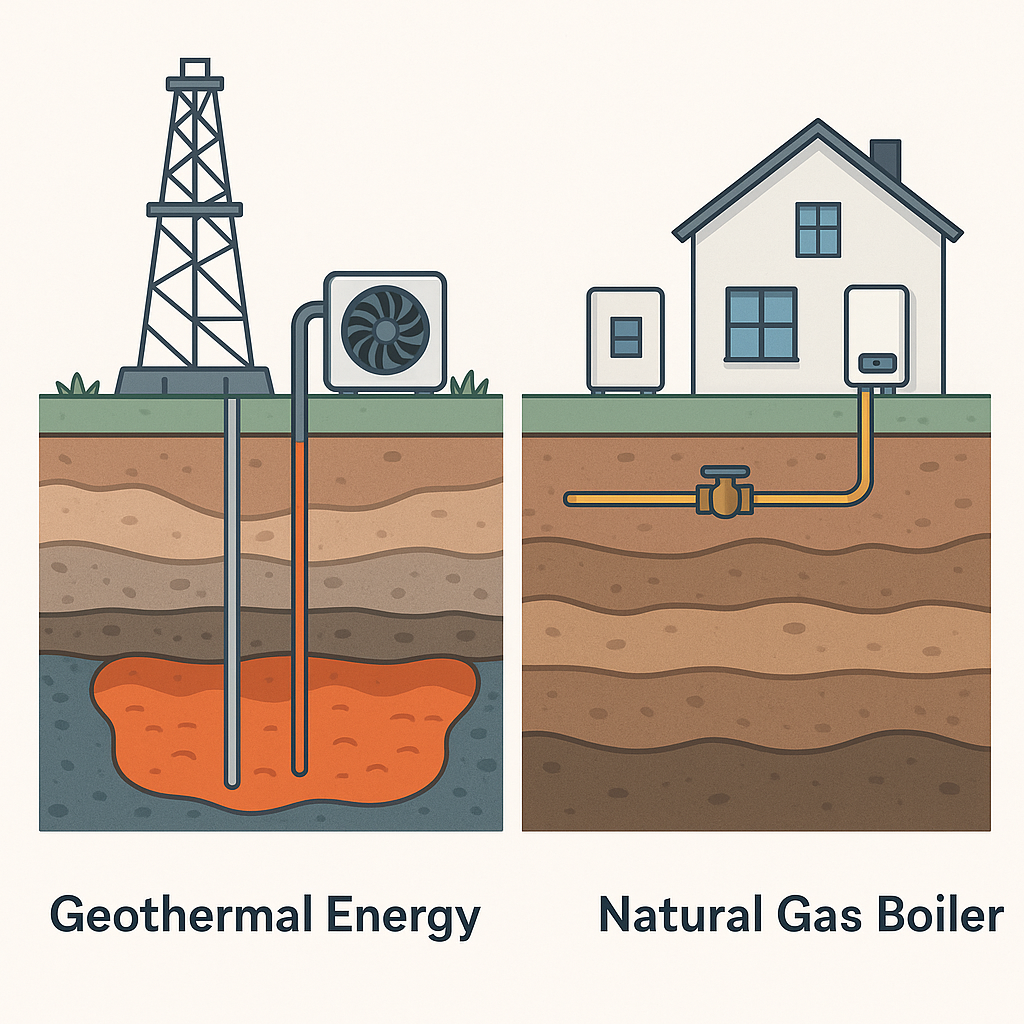Geothermal energy involves harnessing the Earth’s heat from beneath the surface and then generally utilising it to heat homes or commercial buildings.
One common form of geothermal energy is ground source heat pumps or GSHPs. While commercial geothermal energy involves harnessing energy at scale, GSHPs are systems installed on properties that are designed to harness energy beneath the ground on-site, providing a low-carbon way of heating a home.
In this guide, we’ll explain in more detail what a ground source heat pump is, how they function, and whether they are worth it for UK homes.
What Is A Ground Source Heat Pump?

The UK has seen around 300,000 heat pumps installed in recent years. Most of those were air source heat pumps, which, as the name suggests involve capturing energy from the surrounding air in order to heat a property.
However, some 40,000 households have a ground source heat pump installed. But what is a ground source heat pump exactly?
Efficiency And Functioning
A ground source heat pump is a system installed on a property to harness the Earth’s thermal energy, sometimes accessing just a few metres beneath the ground and in other cases, over a hundred metres below the surface.
One of the key selling points of ground source heat pumps is their efficiency, which is around 300-400%. This means that it generates heat output at a rate of about 3x to 4x the amount of electricity needed to power it.
It’s important to note that these efficiency figures are considered ‘coefficient of performance’ or COP. It infers that for a given unit of electricity required to power a heat pump, 3 or 4 units of heat are produced, both measured in kWh. So, it’s not a matter of heat pumps generating actual electricity but heat energy.
These systems, while primarily designed to heat a home during the winter months can also be used to cool buildings in certain cases. As with air source heat pumps, ground source heat pumps can significantly lower your household’s carbon footprint.
Average Installation And Running Costs
Ground source heat pumps are available in the UK and cost approximately £12,000 to £30,000 between supply and installation costs. However, government supports such as the Boiler Upgrade Scheme can reduce the total cost by thousands of pounds.
How much it costs to run a ground source heat pump will depend on the size of your property and your heating needs. For smaller properties, it might cost around £600 to £700 per year, with running costs rising to £700 to £1,000 for the average household and landing at about £1,100 to £1,500 for a large property.
Is It Worth Purchasing A Ground Source Heat Pump In The UK?
Given that a heat pump is a significant investment, households are asking whether or not it is worth the cost. Despite the high price tag, there are several compelling reasons to consider a ground source heat pump.
The Potential to Reduce Heating Bills
One notable upside to ground source heat pumps is the potential to lower energy bills. Currently, the running costs of a GSHP are similar to that of a natural gas boiler, however, gas prices tend to be more volatile than electricity prices meaning the potential for savings can vary.
Possible cost savings become more notable in the long-run. Given that ground source heat pumps can last for several decades, whereas boilers usually last for around 10 to 15 years, it’s entirely possible that after having one installed, a ground source heat pump will save you money over time.
Reasons for this include the potential for more affordable and price-stabilised electricity. The government is aiming for 100% renewable electricity in the 2030s with the UK passing the 50% threshold in 2024.
With an increase in renewables and energy self-reliance, the cost of electricity is likely to rise while (for a range of reasons), natural gas boilers may become more expensive to run while prices will likely remain more volatile. In time, this will likely equate to increased savings with GSHPs over time.
Longer Lifespan Than Gas Boilers
As mentioned, ground source heat pumps can last for decades. On average, they are expected to last for 25-30 years, though some estimates go up to half a century.
While maintenance is still required, their life expectancy significantly exceeds that of gas boilers. On average, a natural gas boiler lasts for around 10 to 15 years before needing to be replaced.
Other Advantages of Ground Source Heat Pumps
Additional benefits to having a ground source heat pump installed include a substantial reduction in household carbon emissions and the ability to future-proof your property with gas boilers likely to be phased out in the coming decades.
Having a ground source heat pump installed now can allow you to get ahead of the curve in that sense. However, this does open up the question of whether it’s better to wait should upfront costs be reduced in the future.
Verdict: Should I Have A Ground Source Heat Pump Installed?
Depending on your budget, the size of your property, and potential governmental supports, a ground source heat pump can certainly be worth the investment.
Cost-wise, GSHPS can vary quite significantly with the following estimates applying:
- Small property – £12,000 to £20,000
- Mid-sized property – £17,000 to £27,000
- Large property – £25,000 to £40,000
If you have a large enough budget then whether or not it’s worth the investment will depend on how confident you are in electricity prices falling and how much the advantages of GSHPs appeal to you.
On the other hand, if you are on a tighter budget but have a relatively small property, you may find it is still worth the investment based on the upsides but also if you are eligible for government financial support. Ultimately, it would really come down to the math and your general sense of whether it feels worth the expense overall.
For some households, there will be strong enough reasons to see a ground source heat pump as a worthwhile investment with long-term potential to save on bills. In other cases, it may be better to hold off until the upfront costs potentially come down further or/and government supports increase further.
All in all, there is a case for and against having a ground source heat pump installed in the UK and it’s important to carefully weigh up the pros and cons and your preferences and budget before making a decision.


